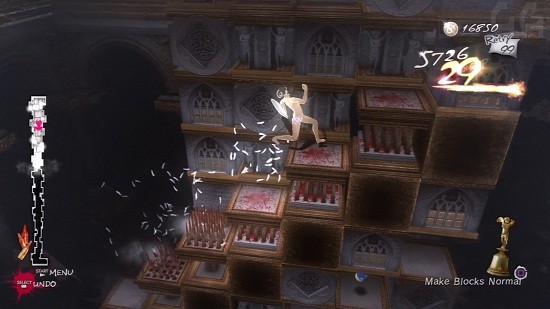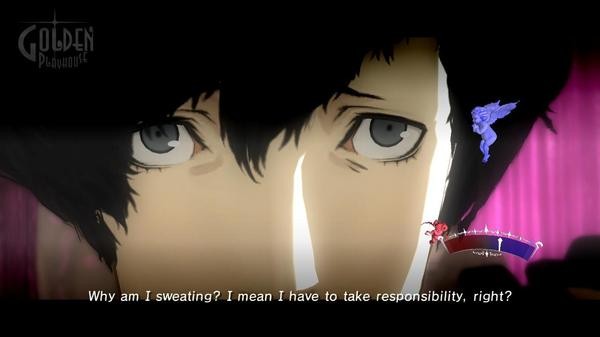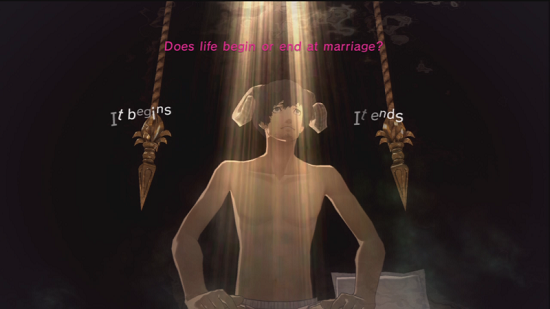
Atlus' Catherine isn't like any other game out there. In a world of video games whose “stories” involve simply shooting people in the face, Catherine's real-world and mature subject matter are a refreshing change of pace. The themes of growing up, infidelity, maturation and handling problems in relationships are sprinkled throughout the game, but not in obvious ways.
Be warned, though! The following discussion will be loaded with end-game spoilers of Catherine's fantastic story. Reader discretion is advised.
]
The story in Atlus' Catherine isn't like any typical video game. Vincent Brooks, the protagonist of this tale, isn't out to save the world or rescue any princess. He's just a poor, drunken 30-something-year-old who has to handle the pressures of his girlfriend Katherine wanting to move forward in their relationship. However, Vincent feels as if he's not ready to take the next step. He can barely take care of himself with the amount of money he's earning, much less take care of the family his lady eventually would want. He doesn't want to lose Katherine, but he also wants things to remain the way they are.

He meets and ultimately has an affair with a younger girl named Catherine who is just as laid-back as he is. She is in no rush to marry; she's happy with the way her life is now and simply wants to enjoy it. This begins the troubles that Vincent must face. Night after night he has nightmares that involve climbing up towers of blocks that continue to collapse below him and fall into the abyss. If he doesn't make the correct decisions and move the blocks the right way, he'll ultimately end up falling to his death. And you know what they say, if you die in your dreams, you'll die in real life. At the end of each night, he's chased by a demonized embodiment of a dilemma that he is forced to face–whether it be Katherine in a wedding dress or a creepy baby with a chainsaw. The strange thing is that the men from the town in which he lives all appear to have the same dream. Some of them don't survive the nightmares and wake up dead.
The Analogy of Maturity and Climbing Blocks

All the nightmare sequences, which take up the majority of the game-play, can be interpreted as symbols of progression and maturity. Vincent is constantly running from something, whether it be the collapsing tower of blocks that he is on or the dilemma-facing night terrors. He frantically rearranges blocks in order to climb these towers and reach the door at the very top, which will lead to his safety–and him waking up alive.
The blocks that Vincent rearranges form stairs, and stairs are common symbols of progression. As one character says in the game, these blocks can be viewed as symbols of Vincent's progression through adulthood. The doors at the top of each tower also represent progression. Doors require initiative to open, and will lead to opportunities.

The necessity to make tough decisions, commit to them and progress along a path is essential to surviving each stage, just like it is essential to get through life's most difficult problems. Tension and urgency intensify the pressure through the time limits imposed by the blocks falling below you and creepy night terrors trying to downright annihilate you.
Catherine's Social Commentary on Japan's Aging Population
It is revealed at the end of the game that the game's bartender, Thomas “Boss” Mutton, is the one cursing indecisive men such as Vincent to endure these nightmares. Men like Vincent, who refuse to grow up and start families are preventing “fertile” women such as Katherine from finding more capable men who are willing to raise children and support the population. Mutton (who turns out to be a god that is sent to protect a given population) has the objective to separate these fertile women from men who won't contribute to the future of the country's population.

It may be a bit ridiculous, but this is a commentary on the problem of Japan's aging population. With 21 percent of its population over the age of 65, Japan has the highest proportion of elderly citizens of any country in the world.
There are numerous factors that contribute to Japan's aging population; higher education, later marriages, an increased number of women in the workforce and small living spaces. One out of every four people in Japan are considered elderly, and this has been a high level of concern for the country. With a man-child like Vincent not moving forward in life and raising a family, Japan's aging population will continue to be a problem.
The Thin Line Between What's “Right” and “Wrong”

Catherine's morality system is unlike the morality system of most modern games. There isn't a clear distinction between “good” and “bad” as there is in games such as Mass Effect, Infamous or Fable II. Instead, it's based on personal preferences and what your own sense of “right” is. In Mass Effect, for example, it's as clear as day whether your decisions are good or bad. Heck, they even tell you whether the decision you're going to make is considered “renegade” or “paragon.” What is considered “right” or “wrong” in Catherine, on the other hand, is a lot less obvious.

For example, one of the questions that is asked during the game's breaks in between the nightmare stages is, “Would you feel worse if you cheated, or if you were cheated on?” Not your typical video-game dilemma, and there is no real “right” answer. At the end of the game, the true purpose of the “morality” meter becomes clear: it's not so much a measure of good and evil, but rather your personal preference between a life of freedom or a life of chaos, a life of predictability or a life of impulsive events. Neither is really a wrong way to live one's life, it's all a matter of preference.
As the mysterious voice behind the confessional says at one point, “There is no wrong way to climb these staircases, so long as you manage to reach the top.”
Check out other video game posts by Peter Mai here:
- Ten Things You Didn't Know About Super Mario Bros.
- Ten Signs You're An Aging Gamer
- “Sorry, I'm Dead”: 30 Most Memorable Video Game Quotes
- Vaporware: 5 Video Games That Should Be Released By Now
- Five Video Games to Convince Non-Gamers They Can Play Video Games
- Ten Unique Ways to Perform the 'Legend of Zelda' Soundtrack


One Reply to “Analyzing CATHERINE's Symbolism, Themes and Social Commentary”